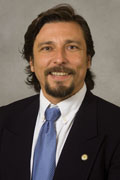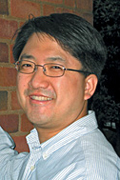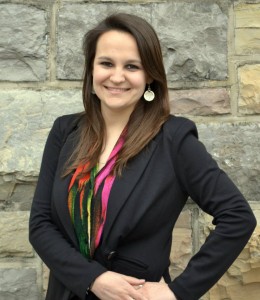

Morgan State University
Primary Project: Measuring User Acceptance of and Willingness-to-Pay for V2V Technology
Dr. Callow is an associate professor of marketing and international business at Morgan State University, Maryland. He received his PhD in business from the City University of New York. He holds an MA in Spanish and Business Studies from the University of Edinburgh. His research interests extend around cross-cultural and sub-cultural issues in consumer behavior and marketing communications. Dr. Callow has also conducted research in nonprofit marketing and transportation issues. He has published his research in various marketing journals, including the European Journal of Marketing, the Journal of Marketing Communications, the Journal of Product & Brand Management, and the International Journal of Advertising.

Virginia Tech Transportation Institute
Primary Project: Develop and Test Connected Vehicle Freeway Speed Harmonization Systems
Hao Chen is currently a PhD. Candidate in Transportation Systems Engineering Program with the Charles E. Via, Jr. Department of Civil and Environmental Engineering at Virginia Tech. He is also working as a Graduate Research Assistant in the Center for Sustainable Mobility at Virginia Tech Transportation Institute (VTTI). His primary areas of interest are traffic flow modeling and simulation, traffic state/travel time estimation and prediction, artificial intelligence applications on Intelligent Transportation Systems, computer vision and pattern recognition, traffic surveillance.
He received both of his Master’s and Bachelor’s degree in Transportation Engineering at Beijing Institute and Technology, Beijing ,China on 2007 and 2005 respectively. He worked on several projects in China including vehicle license plate localization and recognition, face expression recognition to detect fatigue driver, video vehicle tracking and advanced traveler information systems. He honored many awards including best student paper in 2007 World Congress on Intelligent Transportation Systems. He has authored/co-authored more than 20 peer reviewed conference and journal papers. His objective after graduation is to pursue an academic career in transportation area. During free time, he enjoys to travel, watch movies and sport (rowing).

Virginia Tech Transportation Institute
Role: CVI-UTC Director
Dr. Thomas A. Dingus serves as the director for the CVI-UTC, as well as the director of the Virginia Tech Transportation Institute (VTTI) and the National Surface Transportation Safety Center for Excellence (NSTSCE).
Since 1996, Dr. Dingus has managed the operations and research at VTTI. This multidisciplinary organization annually conducts more than $36 million in sponsored program research expenditures. Prior to joining Virginia Tech, Dr. Dingus was founding director of the National Center for Transportation Technology at the University of Idaho and was an associate director of the Center for Computer-Aided Design at the University of Iowa.
Since 1984, Dr. Dingus has conducted transportation safety and human factors research related to driver distraction and attention, the safety and usability of advanced in-vehicle devices, crash avoidance countermeasures, and truck driver fatigue. He has pioneered studies of naturalistic driving, which involve instrumenting cars, trucks, and motorcycles with unobtrusive video cameras and sophisticated instrumentation (e.g., radar) designed to assess crash and near-crash causation and to test a variety of crash countermeasures. VTTI is currently leading such studies worldwide with more than 4,000 equipped vehicles deployed to date.
Dr. Dingus was named a White House Champion of Change and was selected for his exemplary leadership in developing or implementing transportation technology solutions. Dr. Dingus is a Fellow of the Human Factors and Ergonomics Society (HFES), from which he has received several awards, including the A.R. Lauer Award for outstanding contributions to the field of safety. He has had the honor of testifying before U.S. Congressional subcommittees (four times), the National Transportation Safety Board, and the National Council of State Legislatures about issues of driver distraction and attention. Dr. Dingus is a member of the boards of directors of the Association for Unmanned Vehicle Systems International and the Intelligent Transportation Society of America. He was recently elected to serve on Virginia Governor’s Unmanned Systems Commission.
Dr. Dingus has more than 220 technical publications and has managed approximately $300 million in research funding to date ($130 million as principal investigator). Notable projects for which Dr. Dingus has served as a principal investigator or program manager include the 100-Car Study sponsored by the National Highway Traffic Safety Administration (NHTSA), the Heavy Truck Drowsy Driver Warning System sponsored by NHTSA, and the Second Strategic Highway Research Program (SHRP 2) Naturalistic Driving Study (NDS) sponsored by the National Academy of Sciences.

Virginia Tech Transportation Institute
Role: VTTI Consortium Leader
Dr. Zachary Doerzaph is the Director of the Center for Advanced Automotive Research (CAAR) at the Virginia Tech Transportation Institute (VTTI). As Director, Doerzaph coordinates a research portfolio focused on measuring and improving the performance of next generation vehicle systems. His research projects emphasize safety as it relates to the interactions between driver, vehicle, and infrastructure. He focuses his efforts on the design, development, and evaluation of connected vehicles, collision avoidance systems, automated driving systems, driver interfaces, and driver behavior monitoring and evaluation. Presently Doerzaph is working with his team of researchers on a variety of technologies that will improve transportation for all users in the near-term and far into the future.
As VTTI Consortium Leader for the CVI-UTC, he is responsible for developing and articulating the approach, objectives, and vision. With degrees and experience rooted in objective evaluation, Dr. Doerzaph effectively works with developers and stakeholders to obtain consensus on performance management and measurement strategies. Although he operates across levels, Dr. Doerzaph is particularly skilled at conceptualizing and articulating large, complex systems and providing engineers and other developers with the vision necessary to successfully design and develop advanced vehicles and infrastructure.
At VTTI, as a part of CVI-UTC outreach, Open House and School Day tours designed for community members and K-12 students, respectively, offers a rare insight into what it is like to work in transportation research on a daily basis. Each tour session included a video lecture with transportation professionals that featured research projects on naturalistic driving and highly-instrumented vehicles, and visits to the 511/Smart Road control center, the instrumented vehicle garage, and the Virginia Smart Road featuring an artificial rain experience. This April, 235 community members, 315 students and 32 teachers and parents participated in these two tour events. Also this spring, the CVI-UTC was featured at the VTTI booth at the ITS America Conference in National Harbor, MD, and a connected vehicles reception event was held at an off-site location to offer another outlet to inform conference attendees about CVI-UTC research in a casual setting.

Morgan State University
Role: Morgan State University Consortium Leader
Dr. Z. Andrew Farkas, director of the National Transportation Center at Morgan State University, is the consortium leader who is most familiar with the UTC program, as Morgan State has been a part of the UTC program for many, many years. Recently, Maryland Governor Martin O’Malley named Dr. Farkas to the newly formed state Electric Vehicle Infrastructure Council. The council makes informed decisions and recommendations regarding supply, support systems and consumer awareness for the state of Maryland in the adoption of electronic vehicles for commercial and private use. Because of the experience that Dr. Farkas has in electric vehicle technology, and the interest that RITA Intelligent Transportation Systems Joint Program Office has in joining this technology with connected vehicle application, offers the CVI-UTC a distinctive perspective in developing novel research in this area through Dr. Farkas and Morgan State’s participation.
To disseminate information and research gained from the CVI-UTC consortium; there are two unique educational summer opportunities in transportation research offered at Morgan State. First, the National Summer Transportation Institute is a non-residential program, offered to 15-20 Baltimore area high school students. The purpose of the institute is to expose academically gifted high school students to various transportation technologies, concepts and careers, and to enhance academic and interpersonal skills. Second, the Teacher Transportation Institute, a two-week program offered to twenty high school educators focusing on STEM lesson plans and activities and an detailed introduction to emerging transportation technologies, concepts and careers they can relay to their students in the upcoming school year.

Virginia Tech Transportation Institute
Primary Project: Infrastructure Pavement Assessment and Management Applications Enabled by the Connected Vehicles Environment Research Program – Phase I: Proof-of-Concept
Dr. Gerardo Flintsch has 26 years of experience in the areas of pavement management and engineering as well as substantial management experience. He has been the PI or Co-PI for more than 35 research projects (totaling more than $14 million) and has directed multidisciplinary research and development projects in the United States and overseas. He has been the principal investigator for the SHRP2 R06(F) Development of Continuous Deflection Device, the FHWA Splash–Spray Assessment Tool Development Program, a pooled-fund regional consortium focused on optimizing pavement surface characteristics, and the development of a NCHRP Synthesis on Quality Management of Pavement Condition Data Collection. He currently manages the pavement component of the Smart Road project, which has included extensive structural evaluations and pavement instrumentation, and has reviewed current practices for data collection for the World Bank. Dr. Flintsch has written more than 200 journal articles, conference papers, technical reports, and training manuals and has presented his work at many national and international meetings and conferences. He has delivered dozens of professional education training course on pavement design and management, chaired the 2007 National Pavement Management Conference in Norfolk, VA and the Pavement Evaluation 2010 Conference in Roanoke, Va., and is chairing the 9th International Conference on Managing Pavement Assets to be held in the Washington, D.C. area.

Virginia Tech Transportation Institute
Primary Project: Connected Vehicle Applications for Adaptive Lighting
Dr. Ron Gibbons is the director of for Infrastructure Based the Center for Infrastructure Based Safety Systems at the Virginia Tech Transportation Institute (VTTI). He is also the Institute’s lead lighting research scientist and is responsible for lighting- and visibility-associated research projects and projects which consider roadway safety as they relate to infrastructure.
He is currently the PI on multiple projects including studies on the impact of lighting design on roadway safety, the impact of headlamp design on safety, wet night visibility and the performance of alternative light sources in roadway lighting. Gibbons is also the Principal Investigator on the Institute’s IDIQ contract for the FHWA Office of Safety.
Gibbons is the author of several published papers on roadway lighting, photometry and target visibility. He is a Past President of the Illuminating Engineering Society of North America. Gibbons obtained his Ph.D. from the University of Waterloo, Canada.
 Virginia Tech
Virginia Tech
Primary Project: Connected Vehicle-Infrastructure Application Development for Addressing Safety and Congestion Issues Related to Public Transportation, Pedestrians, and Bicyclists

Virginia Tech Transportation Institute
Role: CVI-UTC Program Manager
Ms. Harwood serves as the Program Manager for the Connected Vehicle/Infrastructure University Transportation Center (CVI-UTC), where she manages all project personnel, ensures that deliverables are in accordance with grant requirements, interfaces with DOT personnel, and makes sure that researchers understand the relevant technology. In addition, Ms. Harwood assists in coordinating technology development for CVI-UTC projects and, in collaboration with marketing teams, enhances the public awareness and understanding of CV technology and research results. Finally, she disseminates project results in the form of highlights and publications aimed at increasing awareness of CVI-UTC research activities.
Ms. Harwood is also a Project Associate in the Center for Advanced Automotive Research at the Virginia Tech Transportation Institute (VTTI), where she has been working with connected vehicle (CV) technologies for over five years. She focuses primarily on proposal development, project management, experimental design, data collection, data analysis, and reporting. Ms. Harwood was actively involved in all three phases of the Human Factors for Connected Vehicles (HFCV) project, where she assisted in experimental design and data analysis and helped compile monthly and final reports. Ms. Harwood was also involved with the Connected Vehicle Safety Pilot Model Deployment (SPMD) activities, including designing and conducting spatial data analysis related to performance drive testing under the Driver Acceptance Clinics program. Ms. Harwood also trained participants on CV technology and specific application warnings and interfaces for testing in Ann Arbor, MI under the SPMD, assisted in the verification testing of the integrated light vehicle fleet, and assisted in data analyses.
 University of Virginia
University of Virginia
Primary Project: Connected Vehicle Enabled Freeway Merge Management – Field Test

University of Virginia
Primary Project: Next Generation Transit Signal Priority with Connected Vehicle Technology
Jia Hu is currently a PhD candidate in the Department of Civil and Environmental Engineering at the University of Virginia. He received his Master degree in transportation engineering from the North Carolina State University. He holds a BS degree in structure engineering from Zhejiang University. Prior his study at University of Virginia, he interned at VHB for half year focusing on safety evaluation of access management policies.
His research interests include highway safety, freeway operation, travel time reliability, Intelligent Transportation Systems (ITS), public transportation and microscopic traffic simulations.

Virginia Tech
Primary Project: Developing and Evaluating a Smartphone Application Aimed at Reducing Crashes Involving Motorcycles and Bicycles
Arash Jahangiri is a PhD student with the Charles E. Via, Jr. Department of Civil and Environmental Engineering at Virginia Tech. He received his Master’s and Bachelor’s degree in Civil Engineering from Iran University of Science and Technology. Thereafter, he started his PhD program at Virginia Tech and worked as a Graduate Research Assistant for about two years on the area of Evacuation while he was in Northern Virginia Center (NVC) at Virginia Tech, Falls Church Campus. Research conducted at Virginia Tech Transportation Institute (VTTI) in Blacksburg on different areas such as connected vehicles, traffic safety, and etc. piqued his interest, so he decided to get a Master’s degree with a thesis on the field of Evacuation and then move to Blacksburg to pursue his PhD at VTTI. Jahangiri is currently working as a Graduate Research Assistant at the Center for Sustainable Mobility (CSM) and Center for Infrastructure-Based Safety Systems (CIBSS), both at VTTI. His current research interests comprise Intelligent Transportation Systems, Traffic Safety, and Traffic Flow Theory. His hobbies include playing soccer, travelling, and watching movies.

University of Virginia
Primary Project: Infrastructure Safety Assessment Using Connected Vehicle Data
In three years, Robert completed the undergraduate studies and received a bachelor’s degree in civil engineering with a focus on transportation from the Georgia Institute of Technology. He began his graduate studies at the University of Virginia in the summer of 2012. His current research interests include Intelligent Transportation System applications for traffic management and connected vehicles. He is also interested in government policies on emissions from transportation sources, and the effect of climate change on transportation infrastructure.
Robert’s role in the CVI-UTC focuses on the current research project that involved the Northern Virginia Connected Vehicle test bed. He looks at the connected vehicle environment as a tool to detect “near-miss” collision events. Locations with frequent near-misses will be identified and analyzed in order to detect hot spots where geometric or operational improvements are necessary.
In addition to his work in the CVI-UTC, Robert has been active in various professional groups including the American Society of Civil Engineers (ASCE) and the Institute of Transportation Engineers. Robert helped to design and build a concrete canoe for ASCE’s Carolina’s Conference while at Georgia Tech. More recently, he participated in the VASITE Traffic Bowl in Virginia.

Virginia Tech Transportation Institute
Primary Project: Reducing School Bus/Light-Vehicle Conflicts Through Connected-Vehicle Communications
Mr. Andrew Krum has served as a researcher and development engineer for more than ten years in the field of Human Factors and Ergonomics in ground transportation. Currently Mr. Krum serves as a Sr. Research Associate in the Human Factors and Advanced Systems Test (HFAST) Group within the Center for Truck and Bus Safety at the Virginia Tech Transportation Institute (VTTI). Krum’s service with VTTI involves management of private and public funded projects that focus on the investigation of technologies that support commercial vehicle systems and enhance transportation safety.
Mr. Krum holds a Master of Science in Human Factors Engineering. His professional memberships include the Human Factors and Ergonomics Society (HFES), the Society of Automotive Engineers (SAE), and the Armed Forces Communications and Electronics Association (AFCEA).

Morgan State University
Primary Project: Next Generation Transit Signal Priority with Connected Vehicle Technology

University of Virginia
Primary Project: Prototyping and Evaluating a Smart Phone Dynamic Message Sign Application in the CVI-UTC Testbed
Jiaqi Ma is currently a PhD candidate majoring in transportation systems analysis at the Department of Civil and Environmental Engineering at the University of Virginia. He is also working as a Graduate Research Assistant in the Virginia Center for Transportation Innovation and Research (VCTIR). His current research interests include: advanced traveler information systems, traveler behavior analysis, travel demand modeling, planning for operations, data mining, and intelligent transportation systems.
He earned his B.Sc. and M.Sc in Civil Engineering Department, Beijing Jiaotong University (BJTU), China. Before coming to UVA, he was a Research Associate at BJTU on operational analysis of the urban rail transit. Meanwhile, he also served as a Teaching Assistant and instructor for many transportation courses, such as transportation facility design and transportation network analysis.

Virginia Tech
Primary Project: An Innovative “Intelligent” Awareness System for Work Zone Workers Using Dedicated Short-Range Communications
His areas of research include electronic textiles, wearable and pervasive computing, and interdisciplinary design . He is the co-director, with Mark Jones, of the Virginia Tech Electronic Textiles Lab. He organized a workshop at ISWC 2007 on the Role of Design in Wearable Computing. In September 2009, Lucy Dunne, Tricia Wilson and Martin organized the Symposium on Smart E-textile Solutions at the IFAI Expo. In the spring of 2011, Lisa McNair and Martin organized a workshop at PerCom on Interdisciplinary Approaches to Pervasive Computing Design, which was held as a special session within the PervasivE Learning, Life, and Leisure (PerEL) workshop.

Virginia Tech Transportation Institute
Primary Project: Connected Motorcycle Crash Warning Interfaces
Shane McLaughlin is the Motorcycle Safety Research Group Leader. Shane has been involved in vehicle design and driving safety research for over 15 years. He is the PI on two naturalistic motorcycle studies. His areas of emphasis include motorcycles, driver support systems, vehicle kinematics, and large scale data mining. Prior to coming to VTTI, Shane worked for Ford Motor Company on vehicle programs and advanced system interfaces. He received his PhD in Industrial Engineering from Virginia Tech in 2007.
 Virginia Tech Transportation Institute
Virginia Tech Transportation Institute
Primary Project: Mobile User Interface Development for the Virginia Connected Corridors

Virginia Tech Transportation Institute
Primary Project: Connected Vehicle Applications for Adaptive Lighting
Ms. Alejandra Medina has more than 20 years of professional experience as a transportation engineer, researcher and trainer with a strong commitment to excellence. She combines extensive practical experience with the public and private sectors and a strong academic background. Ms. Medina is currently the president of FM Consultants and is a senior research associate at the Virginia Tech Transportation Institute (VTTI). She has also served as a consultant for the Federal Highway Administration (FHWA); Arizona State University; the United Nations; CSI Ingenieros Consultores; the Ministry of Transportation and Public Works of Uruguay; the National Forest Service; the University of Texas at El Paso; Roy Jorgensen Associates, Maryland; and SNI International Resources, Inc., Phoenix, Arizona. At VTTI, she has directed applied research projects in the areas of safety, transportation, modeling and Intelligent Transportation Systems (ITS). Ms. Medina’s main areas of expertise include safety, transportation and traffic modeling and simulation, infrastructure management, and technology transfer.

Virginia Tech National Capital Region
Primary Project: Emergency Vehicle to Vehicle Communication
Pamela Murray-Tuite has 13 years of experience in the areas of transportation systems analysis, transportation planning, behavior modeling, evacuation modeling, network analysis, path prediction, and risk, resilience, and reliability analysis. She has successfully managed more than 10 research projects for a total exceeding $1.3 million. Many of these projects have entailed interdisciplinary efforts and combinations of behavior modeling, traffic simulation, and optimization. Dr. Murray-Tuite also teaches graduate level courses in the traditional four step urban transportation planning model, network analysis, optimization, and risk and reliability.

Virginia Tech Transportation Institute
Primary Project: Safety and Human Factors of Adaptive Stop/Yield Signs Using Connected Vehicle Infrastructure
Alexandria is currently pursuing her Masters of Science in Civil Engineering with a focus on Transportation Systems Engineering and Highway Safety at the Virginia Polytechnic Institute and State University (Virginia Tech) in Blacksburg Virginia. She is currently working as a Graduate Research Assistant at the Virginia Tech Transportation Institute. After the completion of her PhD, Alex hopes to investigate crashes and other major transportation related disasters as a forensic engineer, eventually she hopes to become a faculty member at a major university conducting research to further increase highway safety.
Originally from Newark, Delaware, Alex graduated from West Virginia University (Let’s go Mountaineers!) in 2012 with a Bachelors of Science degree in Civil Engineering. As an undergraduate at WVU she received the opportunity to work on a USDOT/WVDOT funded research project aimed at evaluating the effectiveness of the Graduated Drivers Licensing program in West Virginia. Alexandria is a member of the Phi Theta Kappa International Honor Society and has been awarded the honor of being named Distinguished Chapter Member as well as writing an award winning Hallmark for Scholarship on both the regional and international level. When Alex isn’t studying, she enjoys listening to live music, especially the blues, and spending time with her family and friends.

University of Virginia
Primary Project: Next Generation Transit Signal Priority with Connected Vehicle Technology
Brian Park, PhD, is an Associate Professor of Civil and Environmental Engineering at the University of Virginia. Prior to joining at the University of Virginia, he was a Research Fellow at the National Institute of Statistical Sciences and a Post-Doctoral Research Associate at North Carolina State University. He also worked at the Texas Transportation Institute in Texas.
He is an editorial board member of the International Journal of Sustainable Transportation and the KSCE Journal of Civil Engineering. He is an elected member of the Board of Governors of the IEEE Intelligent Transportation Systems Society.

University of Virginia
Primary Project: Connected Vehicle Enabled Freeway Merge Management – Field Test
Hyungjun Park is a Research Scientist in the University of Virginia’s Center for Transportation Studies. He is a recipient of the Dwight David Eisenhower Transportation Fellowship from the Federal Highway Administration.
Dr. Park received a B.S. (1996) and M.S. (1999) in City Planning from the Hanyang University, Seoul, South Korea and an M.S (2005) and Ph.D. (2008) in Civil and Environmental Engineering from the University of Virginia. Prior to joining the University of Virginia, he worked as a Transportation Specialist for the Seoul Metropolitan Government in South Korea for five years. His work in Seoul focused on the establishment of traffic management and traveler information systems.

Virginia Tech Transportation Institute
Primary Project: Developing Connected Vehicle Freeway Speed Harmonization Algorithms
Dr. Rakha is a Professor at the Charles E. Via, Jr. Department of Civil and Environmental Engineering and the Director of the Center for Sustainable Mobility (CSM) at the Virginia Tech Transportation Institute (VTTI). He is a Professional Engineer in Ontario and a member of the Institute of Transportation Engineers (ITE), the American Society of Civil Engineers (ASCE), the Institute of Electrical and Electronics Engineers (IEEE), and the Transportation Research Board (TRB). He is on the Editorial Board of the Journal of Transportation Letters and an Associate Editor for the IEEE Transactions of Intelligent Transportation Systems and the Journal of Intelligent Transportation Systems.
Dr. Rakha has authored/co-authored a total of 211 refereed publications of which 103 are fully refereed journal publications. He has made over 200 conference presentations in the areas of traffic flow theory, traffic modeling and simulation, dynamic traffic assignment, traffic control, transportation energy and environmental modeling, and transportation safety modeling.

Morgan State University
Primary Project: Measuing User Acceptance of and Willingness-to-Pay for V2V
Dr. Hyeonshic Shin is assistant research professor of the National Transportation Center at Morgan State University. He is responsible for managing research activities, resources, and project personnel. He has an expertise in freight demand management and transportation safety studies. He is currently leading five studies sponsored by USDOT and Maryland State Highway Administration. His research interests include freight demand management, consolidated urban freight delivery, transportation economics, transportation safety, and transportation policy analysis. He received Ph.D. in Public Policy Analysis from the University of Illinois at Chicago, and MA in Urban Planning from the University of Akron, OH.

University of Virginia
Role: University of Virginia Consortium Leader
Dr. Brian L. Smith is a Professor and Chair of the Department of Civil and Environmental Engineering at the University of Virginia. Dr. Smith specializes in transportation systems engineering and his research focuses on intelligent transportation systems, particularly in advanced transportation management and information technology application, making him and his expertise and experience a great addition to the CVI-UTC consortium.
With the Virginia Department of Transportation (VDOT) as lead agency and the University of Virginia Center for Transportation Studies (UVA CTS) as technical leadership provider, Cooperative Transportation Systems holds the potential to support a fundamental advance in surface transportation. While the vehicle component and infrastructure component of the transportation system have traditionally been only loosely coupled, connected vehicle technology will allow the components to “work” actively together – creating Cooperative Transportation Systems. This provides the potential for reduction in congestion, safety improvements, and improved traveler services. In order to realize this potential, Cooperative Transportation Systems will require unprecedented collaboration between the private and public sectors, on a scale not required in the current loosely coupled system. The insight that VDOT and UVA CTS is gaining in this pooled fund study is being woven into applications that will be prototyped and demonstrated in the CVI-UTC.

Virginia Tech Transportation Institute
Primary Project: Human Factors Evaluation of an In-Vehicle Active Traffic and Demand Management (ATDM) System

Virginia Tech Transportation Institute
Primary Project: Connected Motorcycle System Performance
Reginald Viray is a Research Associate in the Center for Advanced Automotive Research (CAAR) at Virginia Tech Transportation Institute (VTTI). He primarily works within the Connected Vehicle Systems Group by assisting in data acquisition, analysis, export, remote monitoring, tool creation, and quality assurance. Reginald has also worked on projects measuring RF communications performance, GPS positioning performance, vehicle crash alert algorithms, and driver reactions to connected vehicle systems.Reginald holds a B.S. in Electrical Engineering from Virginia Tech and is currently working on his M.S. in Industrial Systems Engineering with a concentration in Management Systems from Virginia Tech.